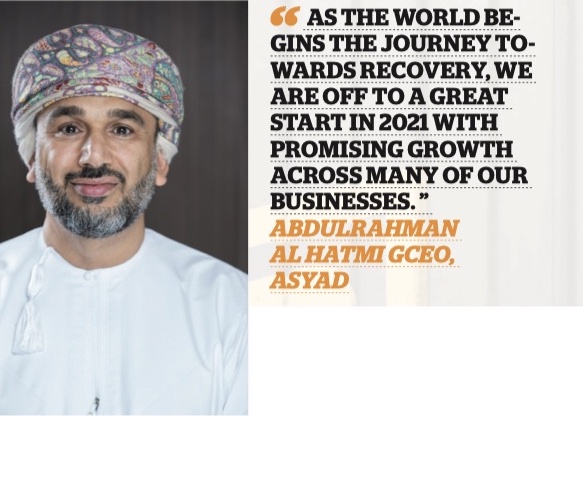ABDULRAHMAN AL HATMI GCEO, ASYAD DISCUSSES HOW ASYAD IS HELPING DEVELOP OMAN’S LOGISTICS SECTOR into a world-class industry
Issue 195 | June - July 2021
Asyad is Oman’s global integrated logistics service provider and the cornerstone of Oman’s ambition to reclaim its 2,000-year-old regional trade leadership and establish the country as one of the world’s top ten logistics hubs by 2040.
Established in 2016, Asyad offers integrated service and end-to-end logistics solutions to meet market needs and support Oman’s economy. The Group comprises three deep ports and three free zones backed by Oman’s five airports, and a world-class road network.
In addition, Asyad operates an extensive shipping and sea transport network that connects Oman to critical ports across the region and the globe. This allows optimal use of its diverse and powerful support assets, including its renowned Asyad Express service that serves e-commerce, manufacturing, finance, and other businesses.
Asyad connects Oman’s ports and industries to regional and global markets bringing together services, solutions and companies under one brand umbrella to ensure trade facilitation, better performance, fewer handovers, and advanced delivery capabilities. Oman ranked first in the GCC on the Trading Across Border Index by the World Bank, and first in the world in port call hours according to UNCTAD while scoring an impressive 2.5 per cent goods inspection rate compared to an average three per cent across the EU.
“I joined Asyad Group as its Chief Executive Officer in 2016. Starting my career as a mechanical engineer in the oil and gas sector, I witnessed firsthand the importance of reliable logistics services and this sparked my interest in the sector. In 2013, I moved to Oman Rail and developed my expertise in transport and infrastructure,” said Abdulrahman Al Hatmi GCEO, Asyad. “As CEO of Asyad, I saw this as a great personal challenge and opportunity to contribute to building a comprehensive national logistics ecosystem that supports industries and provides an essential lever to the national economy. My position enables me to serve Oman’s economic and trade interests and contribute to national planning, starting with Oman’s National Logistics Strategy (SOLS 2040). Asyad’s mission today, and my personal goal, is to develop the logistics services network enabling Oman to take back its historic status as a leading maritime trade centre and premier global logistics destination.”
The logistics sector is rapidly changing with the introduction of 4IR technologies, the development of e-commerce, and the broadening scope of demand for logistics solutions.
Clients today are looking for comprehensive solutions and one-stop shops that can accommodate their evolving needs. This led to a significant shift in the industry towards integrating services and adopting customer-centric approaches. Asyad adopted this exact approach by integrating and restructuring its businesses to offer end-to-end solutions to its local and international clienteles and grant them easier access to regional and international markets.

“In Oman’s context, the logistics industry is entering an era of nationalisation as the country embraces a tech-based economy and the logistics sector prepares to support the push towards industrialisation. Asyad is playing an active role not only by facilitating cross-border trade allowing national industries to scale their businesses to regional and international levels, but also by adopting cutting-edge technologies that would create a state-of-the-art logistics infrastructure,” noted Al Hatmi.
The COVID-19 crisis changed the logistics landscape and gave rise to challenges that will linger for years to come. However, Asyad Group proved its resilience and exceptional ability to respond to contingencies and turn challenges into opportunities.
“We are proud with Asyad’s exceptional performance in 2020 reaching new highs with container handling volumes at all Omani Ports increasing by five per cent in 2020, while dry bulk handling volumes reached 31,777,910 tons with an increase of 14.5 per cent in 2020 compared to 2019. Small and medium ports direct imports handling have also increased by 17 per cent in 2020 compared to 2019; and Asyad Lines volumes exceeded the target by 24 per cent. All these figures confirm our ability to overcome global challenges and turn them into growth opportunities,” stated Al Hatmi.
“As the world begins the journey towards recovery, we are off to a great start in 2021 with promising growth across many of our businesses. We are set to keep safeguarding the supply chain and to provide robust and reliable logistics services that pave the way to economic recovery.”
